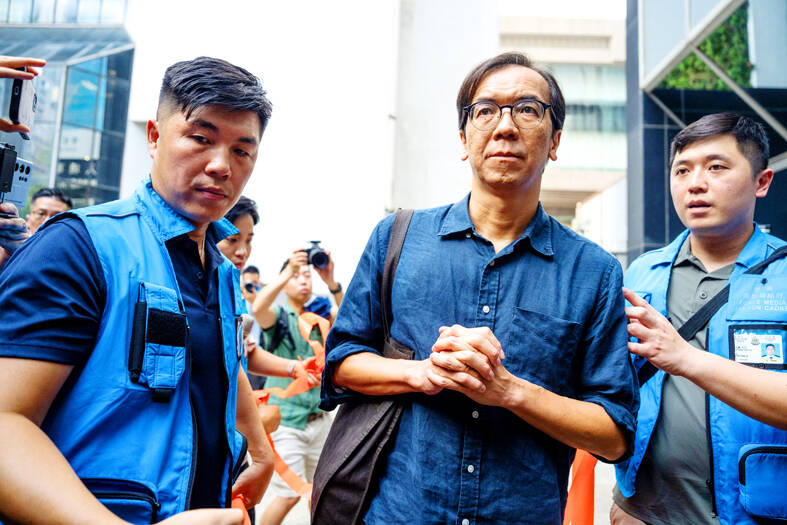A Hong Kong court convicted two former editors of a shuttered news outlet yesterday, in a sedition case that is widely seen as a barometer for the future of media freedom in the territory once hailed as a bastion of free press in Asia.
Stand News former editor-in-chief Chung Pui-kuen (鍾沛權) and former acting editor-in-chief Patrick Lam (林紹桐) were arrested in December 2021. They pleaded not guilty to the charge of conspiracy to publish and reproduce seditious publications. Their sedition trial was Hong Kong’s first involving media since the former British colony returned to Chinese rule in 1997.
Stand News was one of the territory’s last media outlets that openly criticized the government amid a crackdown on dissent that followed massive pro-democracy protests in 2019.

Photo: EPA-EFE
It was shut down just months after the pro-democracy Apple Daily newspaper, whose jailed founder Jimmy Lai (黎智英) is fighting collusion charges under a sweeping national security law enacted in 2020.
Chung and Lam were charged under a colonial-era sedition law that has been used increasingly to crush dissidents. They face up to two years in prison and a fine of HK$5,000 (US$641) for a first offense.
Best Pencil (Hong Kong) Ltd, the outlet’s holding company, was convicted on the same charge. It had no representatives during the trial, which began in October 2022.
Judge Kwok Wai-kin (郭偉健) in his written judgement said that Stand News became a tool for smearing the Beijing and Hong Kong governments during the 2019 protests.
“When speech, in the relevant context, is deemed to have caused potential damage to national security and intends to seriously undermine the authority of the Chinese central government or the Hong Kong government ... it must be stopped,” he said.
The case was centered on 17 articles. Some promoted “illegal ideologies,” or smearing the security law and law enforcement officers, prosecutors said.
Judge Kwok found that 11 of the articles carried seditious intent, including commentaries written by activist Nathan Law (羅冠聰) and esteemed journalists Allan Au (區家麟) and Chan Pui-man (陳沛敏). Chan is also Chung’s wife.
Chung appeared calm after the verdict was handed down, while Lam did not appear in court due to health reasons. The pair were given bail pending sentencing on Sept. 26.
Defense lawyer Audrey Eu (余若薇) read out a mitigation statement from Lam, who said Stand News reporters sought to run a news outlet with fully independent editorial standards.
“The only way for journalists to defend press freedom is reporting,” Eu quoted Lam as saying.
Eu did not read out Chung’s mitigation letter in court. However, local media quoted his letter, in which he wrote that many Hong Kongers who are not journalists have held to their beliefs, and some have lost their own freedom because they care about everyone’s freedom in the community.
“Accurately recording and reporting their stories and thoughts is an inescapable responsibility of journalists,” he wrote.

CHAOS: Iranians took to the streets playing celebratory music after reports of Khamenei’s death on Saturday, while mourners also gathered in Tehran yesterday Iranian Supreme Leader Ayatollah Ali Khamenei was killed in a major attack on Iran launched by Israel and the US, throwing the future of the Islamic republic into doubt and raising the risk of regional instability. Iranian state television and the state-run IRNA news agency announced the 86-year-old’s death early yesterday. US President Donald Trump said it gave Iranians their “greatest chance” to “take back” their country. The announcements came after a joint US and Israeli aerial bombardment that targeted Iranian military and governmental sites. Trump said the “heavy and pinpoint bombing” would continue through the week or as long

TRUST: The KMT said it respected the US’ timing and considerations, and hoped it would continue to honor its commitments to helping Taiwan bolster its defenses and deterrence US President Donald Trump is delaying a multibillion-dollar arms sale to Taiwan to ensure his visit to Beijing is successful, a New York Times report said. The weapons sales package has stalled in the US Department of State, the report said, citing US officials it did not identify. The White House has told agencies not to push forward ahead of Trump’s meeting with Chinese President Xi Jinping (習近平), it said. The two last month held a phone call to discuss trade and geopolitical flashpoints ahead of the summit. Xi raised the Taiwan issue and urged the US to handle arms sales to

State-run CPC Corp, Taiwan (CPC, 台灣中油) yesterday said that it had confirmed on Saturday night with its liquefied natural gas (LNG) and crude oil suppliers that shipments are proceeding as scheduled and that domestic supplies remain unaffected. The CPC yesterday announced the gasoline and diesel prices will rise by NT$0.2 and NT$0.4 per liter, respectively, starting Monday, citing Middle East tensions and blizzards in the eastern United States. CPC also iterated it has been reducing the proportion of crude oil imports from the Middle East and diversifying its supply sources in the past few years in response to geopolitical risks, expanding

Pro-democracy media tycoon Jimmy Lai’s (黎智英) fraud conviction and prison sentence were yesterday overturned by a Hong Kong court, in a surprise legal decision that comes soon after Lai was jailed for 20 years on a separate national security charge. Judges Jeremy Poon (潘兆初), Anthea Pang (彭寶琴) and Derek Pang (彭偉昌) said in the judgement that they allowed the appeal from Lai, and another defendant in the case, to proceed, as a lower court judge had “erred.” “The Court of Appeal gave them leave to appeal against their conviction, allowed their appeals, quashed the convictions and set aside the sentences,” the judges